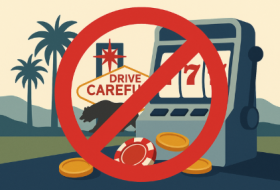
The Illinois House Gaming Committee will discuss online casino legislation during its March 19 hearing, potentially shedding light on whether iGaming has a path to legalization now or in the future. While previous efforts to legalize online casinos in Illinois have stalled, the hearing could indicate whether shifting circumstances, such as budget gaps, have improved the bill’s chances.
Proponents of online casinos argue they can be a much-needed tax revenue stream and a way to curb illegal gambling. The bill, known as the Internet Gaming Act, was introduced by Rep. Edgar González, Jr. on February 6. González, a long-time supporter of iGaming, previously sponsored a similar bill in 2023. However, that effort, also active in 2024 due to the state’s two-year legislative session, saw little movement and no action.
Like many other states, Illinois’s online casino legalization faces severe opposition from the retail casino industry, which fears cannibalization. Additionally, iGaming is up against the highly influential video gaming terminal (VGT) industry. VGTs generate the highest gaming revenue and taxes in the state, but the market is already saturated and the business owners who rely on the machines are resistant to any more competition being added.
iGaming could fill budget gaps, reduce illegal gambling
The Gaming Committee had already heard arguments about legalizing online casinos last week, but there was no vote. Rep. González, Jr. argued that the state is facing budget shortfalls and that legalizing iGaming would provide a financial safety net. He cited the 2020 pandemic recession as a time when online casino tax revenue would have helped the state. Illinois Gov. J.B. Pritzker has also signaled openness to the idea, calling online casinos “worthy of consideration” to support the state budget.
Illegal gambling is another major concern. James Hartmann, a FanDuel lobbyist, told the panel that Illinois is already flooded with unregulated offshore operators who don’t pay taxes. As reported by the Capital News Illinois, Hartmann said:
Whether or not you choose to pass legislation legalizing iGaming, it is already here.
Right now, you can take out your phone and in five minutes, be gambling real money slot machines from the app store, unregulated and untaxed.
Hartmann and other proponents say iGaming could generate $1 billion in tax revenue. However, Harmann’s estimate might be optimistic. For context, neighboring Pennsylvania generated around $840 million in the last fiscal year, with a slightly higher population than Illinois, an established online casino market, and an aggressive tax rate. Other estimates have suggested that the state would generate $450 million in year one and rising to about $800 million after a few years.
As expected, iGaming faces a strong opposition
While proponents rally around potential tax revenue, opponents argue that introducing online casinos would prove a zero-sum game. The General Assembly’s fiscal forecasting agency supports that argument, documenting how new gambling options impact existing ones. In its last annual report, released in October, the Commission on Government Forecasting and Accountability highlighted the continued decline of Illinois’ horse-racing and riverboat casinos, two of the state’s oldest gaming options.
The Illinois Gaming Board is also against the proposed legislation. One reason is that it struggles to keep up with existing regulatory responsibilities. The regulator also opposes iGaming because the General Assembly has not taken action on banning unregulated sweepstakes machines.
Meanwhile, Jay Keller, a contract lobbyist for Penn Entertainment Inc., which operates the Hollywood Casino iGaming platform and ESPN Bet sportsbook, argued the company spent around $600 million enhancing its retail properties in Illinois, with the understanding that the state’s gaming picture will remain the same.
After the hearing, House Gaming Committee Chair Dan Didech stated that any iGaming bill would face a long road ahead due to opponents’ “well-founded” concerns.




